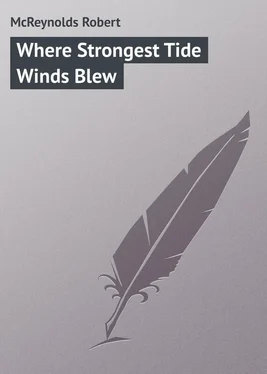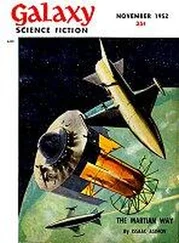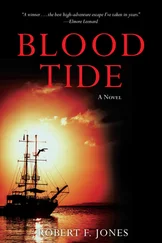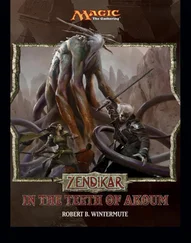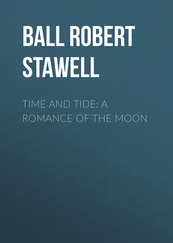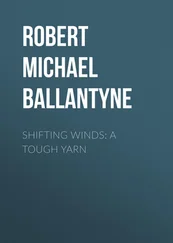Robert McReynolds - Where Strongest Tide Winds Blew
Здесь есть возможность читать онлайн «Robert McReynolds - Where Strongest Tide Winds Blew» — ознакомительный отрывок электронной книги совершенно бесплатно, а после прочтения отрывка купить полную версию. В некоторых случаях можно слушать аудио, скачать через торрент в формате fb2 и присутствует краткое содержание. Жанр: Прочие приключения, foreign_prose, на английском языке. Описание произведения, (предисловие) а так же отзывы посетителей доступны на портале библиотеки ЛибКат.
- Название:Where Strongest Tide Winds Blew
- Автор:
- Жанр:
- Год:неизвестен
- ISBN:нет данных
- Рейтинг книги:4 / 5. Голосов: 1
-
Избранное:Добавить в избранное
- Отзывы:
-
Ваша оценка:
- 80
- 1
- 2
- 3
- 4
- 5
Where Strongest Tide Winds Blew: краткое содержание, описание и аннотация
Предлагаем к чтению аннотацию, описание, краткое содержание или предисловие (зависит от того, что написал сам автор книги «Where Strongest Tide Winds Blew»). Если вы не нашли необходимую информацию о книге — напишите в комментариях, мы постараемся отыскать её.
Where Strongest Tide Winds Blew — читать онлайн ознакомительный отрывок
Ниже представлен текст книги, разбитый по страницам. Система сохранения места последней прочитанной страницы, позволяет с удобством читать онлайн бесплатно книгу «Where Strongest Tide Winds Blew», без необходимости каждый раз заново искать на чём Вы остановились. Поставьте закладку, и сможете в любой момент перейти на страницу, на которой закончили чтение.
Интервал:
Закладка:
McReynolds Robert
Where Strongest Tide Winds Blew
I.
UNDER THE SWORD OF DAMOCLES
We built our cabin high on the slopes of the Sangre de Christo range, overlooking the broad, level San Luis Valley, in Colorado. At the rear of the cabin rose a towering cliff or rather a huge slab of rock standing edgewise more than two hundred feet high, apparently the upheaval of some mighty convulsion of nature in ages gone. Near the base of this cliff flowed a clear crystal spring.
Some hundred yards west of the cabin was the mouth of a tunnel into which we had drifted with pick, shovel and giant powder, a distance of 300 feet in five months of hard toil. A trail led from the tunnel to the cabin along the mountain side, which was thickly studded with tall pines. Another trail led down the mountain slopes in a winding way to the valley, almost a mile below. Above, reaching far into the blue dome of the sky, rose the peaks of the snow-capped Sangre de Christo, glistening in the morning sunlight, which threw gaunt, fantastic shadows in cañon and deep ravine.
It was a wild, weird scene, where man, in strength and vigor, seems to imbibe a portion of the divine essence that lives, and moves, and has its being in the vast solitudes.
We struck pay rock at the first thirty feet of tunneling, so Amos’ assay showed, and the rock had gradually increased in value, week by week. Buchan would take samples of the ore every week or ten days and walk a distance of twenty-five miles to Saguache, where old man Amos, expert geologist and assayer, would for two dollars and fifty cents make out a clean printed slip with figures in red ink, showing so many ounces of lead, copper, silver and gold to the ton.
The ore had not yet reached a value which would pay to ship it, but the increase of values was so steady, and Amos was so extravagantly encouraging, that we were always in buoyant expectation of rich ore. He would say, “You boys have a wonderful prospect. Keep right on with your work; it is getting richer with every stroke of your pick and you are likely to uncover a million dollar drift any day.”
Buchan would bring the assay certificate back to the cabin, where we would sit late by the light of the pine knots in the fire place and talk of the golden millions which capitalists would yet gladly pay for a half interest in the “Aberdeen.”
That was the name Buchan had given the mine, after his home town in Scotland, of which he always spoke with a fond tenderness.
Winter had come and we, John Buchan, Will Carson, and myself, had chipped in almost our last dollar and brought a wagon load of flour, bacon and canned goods from Saguache to the foot of the mountains, then carried them on our backs to the cabin. We quit work on the mine for ten days and chopped firewood, which we corded at the rear of our house. All hands felt that we were as snugly housed for the winter as the big grizzly bears in their lairs among the rocks.
Snow had been falling for several days and it lay deep on the mountain slopes and in the wide expanse of the valley below. We had not had an assay for two weeks and all were anxious for another report from Amos. Buchan wanted his mail also, and he took a small bag of the rock and tramped the twenty-five miles to Saguache. It was a three days’ trip wading through the unbroken snow drifts, and it was night when he returned, weary, footsore and angry.
I can see him yet, tears trickling down his honest face, as he tried to tell something about Amos. He spoke of “the scamp, the villain, and robber,” and then choked with rage. Like all Scotchmen, the more he thought of the wrong done him, the angrier he became; he would be more angry tomorrow and it would be the day after that his anger would reach the climax, and begin to subside. This was not a peculiarity of Buchan. It is a characteristic of the Scotch.
We made him a cup of coffee and seated him comfortably before the fire. When he calmed down somewhat, he explained.
“The first thing I did the next morning after reaching Saguache, was to eat breakfast, and then I took the samples of ore to Amos’ assay office. He was garrulous as usual, and said to come in two hours and he would have the certificate of the assay ready for me. When I again called he handed me the certificate and I paid him the usual two dollars and fifty cents. It showed nine dollars and ninety cents to the ton. The usual increase of ten per cent. over the last assay.
“I crossed over to the postoffice, and while waiting for my mail, I noticed the snow standing ten inches high on the cap of the flue of Amos’ assay furnace. I thought, how in the deuce did he assay our ore without melting the snow on the cap of the flue? The more I thought about it the more I was mystified. I went across to his office and said, ‘Amos, I suppose you gave us the usual fire test on this ore?’ ‘Yep,’ he answered. ‘Then tell me,’ I cried, ‘how in the devil did you make the fire test without melting the snow off the cap of your furnace flue?’ ‘Too cold to melt,’ he replied.
“Then I rushed past him into the back room. The furnace was cold and the frost had gathered on the iron door. I don’t suppose there had been a fire in it for a week. I took Amos by the whiskers and told him to own up that he had not made a fire test of our ore. Then he acknowledged that he had been guessing at it all along.”
“You don’t mean there is a doubt about us having pay rock?” we yelled in a chorus.
“All kinds of doubt,” said Buchan. “I am told there is a suspicion that Amos gives everybody an assay showing values, where there are no values–this for the purpose of keeping up work in the district–and to those who have found values, he gives them an assay showing nothing. At the same time he gives Rayder, the Denver capitalist, a tip and he buys up the property for a song, giving Amos a fat commission for his part in the deal. The chances are that we have no more gold in our rock than there is in that jug handle.”
The news was astounding. We sat for a while by the fire like men stricken dumb. There was no doubting Buchan’s statement. Deception was no part of his nature. He was nearly twenty-six years of age, athletic, strong and quick of perception. He had seen much of the world and knew men. No, there could be no doubt; he was not mistaken.
We were heartsick. Almost our last dollar had gone to pay for the bogus assay. Our golden dream of months was vanishing. Carson broke the silence.
“I will go to Saguache tomorrow. I shall pulverize that jug handle and take it to Amos; he does not know me; I shall have him assay it, and if he gives me gold values there will be trouble!”
I was awakened the next morning by the sound of a hammer. Carson was pulverizing the jug handle. After a hasty breakfast, he buckled on his cartridge belt with a Colt 44-six shooter in his holster, and was soon wading through the snow-drifts down the trail towards Saguache. I watched him through the window until he was lost to view.
The sun rose in a clear sky; the glistening peaks of the Sangre de Christo shone white against a turquoise blue; clumps of snow melted from the branches of the pines and made hollows in the smooth banks of white where they fell.
I turned to Buchan. He was tossing restlessly in his bunk.
“I would hate to be Amos if he gives Carson an assay of values from that jug handle.
“Yes, yes,” he muttered incoherently. “The day of reckoning comes to all. I have seen it. I have seen the sky turn black, the waves rise mountain-high out of the sea, the earth rock and reel, the dead roll out of their coffins in the cerements of their graves, the living fall upon their faces to hide from the wrath of Almighty God! I have seen it just as Paul tells about it. I have heard the roar of the winds, seen palaces crumble and fall–like John of Patmos, I lift up my voice–I, John.”
Читать дальшеИнтервал:
Закладка:
Похожие книги на «Where Strongest Tide Winds Blew»
Представляем Вашему вниманию похожие книги на «Where Strongest Tide Winds Blew» списком для выбора. Мы отобрали схожую по названию и смыслу литературу в надежде предоставить читателям больше вариантов отыскать новые, интересные, ещё непрочитанные произведения.
Обсуждение, отзывы о книге «Where Strongest Tide Winds Blew» и просто собственные мнения читателей. Оставьте ваши комментарии, напишите, что Вы думаете о произведении, его смысле или главных героях. Укажите что конкретно понравилось, а что нет, и почему Вы так считаете.
